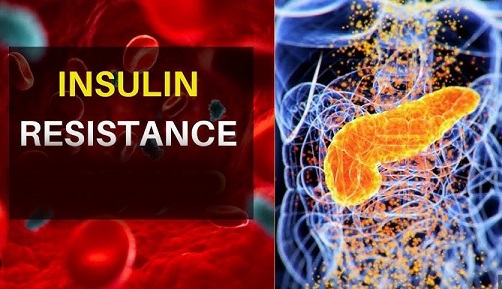Nikhil Prasad Fact checked by:Thailand Medical News Team Nov 17, 2024 4 months, 3 weeks, 6 days, 3 hours, 30 minutes ago
Medical News: Despite significant advancements in medicine, conditions like cardiovascular diseases, cancer, and neurodegenerative disorders remain the leading causes of mortality. Surprisingly, a condition known as hyperinsulinemia (excess insulin in the bloodstream) linked with insulin resistance (IR) is a silent but critical contributor to these problems. This
Medical News report delves into this hidden epidemic, offering insight into its prevalence and devastating effects on health.
 The Silent Impact of Insulin Resistance on Health
The Silent Impact of Insulin Resistance on Health
Hyperinsulinemia and insulin resistance (IR), often undiagnosed, have surpassed 50% prevalence globally and are steadily rising. Even children, particularly those overweight, show alarming rates of insulin resistance. The condition typically manifests as type 2 diabetes, heart disease, cancer, cognitive decline, or dementia after years of silent damage.
What Is Insulin Resistance?
Insulin resistance occurs when cells fail to respond efficiently to insulin, leading to increased insulin production by the pancreas. Over time, this excess insulin wreaks havoc, impacting various bodily systems. The condition creates a vicious cycle: insulin resistance worsens hyperinsulinemia, and the reverse also holds true. These conditions silently degrade organ health over time.
Factors such as genetic predisposition, obesity, and sedentary lifestyles play a role in IR development. Visceral fat, particularly harmful, releases substances that interfere with insulin function, triggering widespread metabolic imbalances.
Additionally, environmental and dietary changes, including high-sugar diets and processed foods, have amplified the problem.
Key Findings on Health Impacts
-Cardiovascular System
Hyperinsulinemia disrupts the balance of nitric oxide (a vasodilator) and endothelin-1 (a vasoconstrictor), leading to restricted blood flow and hypertension. This imbalance fosters conditions such as thickened arterial walls, high triglycerides, and low HDL cholesterol, setting the stage for heart disease.
Studies reveal that reducing insulin levels can lower blood pressure and improve cardiovascular health.
-Cellular Aging and Cancer
Hyperinsulinemia accelerates cellular aging by increasing oxidative stress and altering DNA. This process, known as cellular senescence, contributes to cancer development. Research shows that excess insulin promotes tumor growth by interacting with insulin-like growth factor receptors. Additionally, it fuels angiogenesis, the process of blood vessel formation, which tumors exploit for nourishment. Reducing insulin levels or targeting its pathways could become a valuable cancer prevention strategy.
-Brain Health
Cognitive disorders, including Alzheimer’s disease, have strong links to hyperinsulinemia and IR. Chronic insulin dysfunction damages neuronal pathways and contributes to the buildup of harm
ful proteins like amyloid beta, associated with dementia. Emerging research highlights insulin’s critical role in brain function, influencing memory and mood.
-Liver and Reproductive Health
Hyperinsulinemia often leads to non-alcoholic fatty liver disease (NAFLD), which can progress to cirrhosis or liver cancer. It also plays a central role in polycystic ovary syndrome (PCOS), a leading cause of infertility. Insulin acts as a co-gonadotropin in the ovaries, disrupting normal hormonal cycles.
Diagnosis and Screening
Accurate diagnosis of insulin resistance is crucial but challenging. The euglycemic–hyperinsulinemic clamp remains the gold standard but is impractical for routine use. Instead, simpler methods like the HOMA-IR index, triglyceride-glucose index (TyG), and triglyceride-to-HDL ratio are effective alternatives. Early detection could significantly reduce the risk of severe complications.
Addressing the Problem
-Lifestyle Modifications
A balanced diet low in carbohydrates, regular physical activity, and stress management form the cornerstone of prevention. Exercise boosts insulin sensitivity by enhancing glucose uptake in muscles, while healthy eating mitigates the triggers of insulin resistance.
-Pharmacological and Natural Interventions
When lifestyle changes fall short, insulin-sensitizing medications or natural supplements may be prescribed. These aim to reduce insulin levels and restore metabolic balance. Despite available interventions, a coordinated global effort for prevention and treatment remains limited.
Conclusion
Hyperinsulinemia and insulin resistance are silent but significant drivers of numerous health challenges. The conditions demand attention from healthcare systems worldwide. Early screening, lifestyle interventions, and tailored treatments are essential to prevent long-term damage. Addressing this hidden epidemic could transform public health outcomes, alleviating the burden of diabetes, cardiovascular disease, cancer, and cognitive decline.
The study findings were published in the peer-reviewed journal: Biomedicines.
https://www.mdpi.com/2227-9059/12/10/2416
For the latest on Insulin Resistance, keep on logging to Thailand
Medical News.
Read Also:
https://www.thailandmedical.news/news/canadian-study-finds-that-insulin-resistance-in-the-brain-contributes-to-cognitive-decline-and-psychiatric-issues
https://www.thailandmedical.news/news/diabetes-news-induced-hookworm-infection-showed-improvements-in-type-2-diabetes-patients-as-fasting-glucose-and-insulin-resistance-were-lowered
